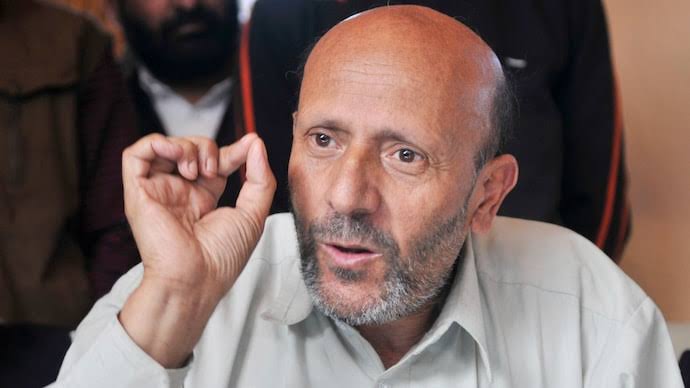Awami Ittehad Party alleges covert coordination between National Conference and BJP in the Nagrota bypolls, calling the fight a “staged political drama” and vowing to build a new grassroots alternative in Jammu and Kashmir.
By: Javid Amin | 08 November 2025
The Awami Ittehad Party (AIP) has accused the National Conference (NC) and Bharatiya Janata Party (BJP) of being engaged in a “friendly contest” in the Nagrota bypolls, alleging that both parties are “pretending to be rivals” while maintaining covert political coordination behind the scenes.
Party leaders Sheikh Ashiq and Inam Un Nabi issued a joint statement on Sunday, calling the ongoing Nagrota and Budgam bypolls a “political farce designed to protect entrenched dynastic interests.”
AIP’s Core Allegation: A Staged Rivalry
According to the AIP, the Nagrota by-election is not a genuine political battle but a “managed contest” between two forces that have historically benefited from one another’s presence.
“The National Conference and BJP are not fighting — they are acting,” said Inam Un Nabi.
“This is not democracy; it’s a drama scripted to maintain their joint dominance.”
The AIP leaders claimed that Chief Minister Omar Abdullah made only a “token visit” to Nagrota, suggesting that the NC’s campaign lacked real commitment — a sign, they allege, of prearranged understanding between the ruling and opposition camps.
AIP’s Attack on Dynastic Politics
Extending their critique beyond Nagrota, AIP leaders accused the National Conference (NC), People’s Democratic Party (PDP), and BJP of perpetuating dynastic and elitist control over Jammu and Kashmir’s politics.
“The same families who ruled for seventy years are now fighting mock battles to stay relevant,” said Sheikh Ashiq.
“Whether it’s Nagrota, Budgam, or Ganderbal — the faces change, but the families remain the same.”
The AIP maintained that these parties have monopolized political representation, leaving ordinary citizens voiceless and alienated from decision-making processes.
Nagrota Bypolls: The Political Context
The Nagrota seat, located in the Jammu region, fell vacant following the resignation of the sitting MLA earlier this year.
The by-election, scheduled for November 11, 2025, comes at a critical juncture when two major contests — Budgam and Nagrota — are being seen as litmus tests for party strength and regional voter sentiment.
In Budgam, the contest is dominated by three candidates from the influential Aga family, representing the NC, PDP, and BJP, turning it into a symbolic clash of lineage and sectarian influence.
In Nagrota, the NC and BJP are the primary contenders — though, according to the AIP, their rivalry is more cosmetic than competitive.
AIP’s Strategy: Positioning as the Real Opposition
The Awami Ittehad Party, founded by Engineer Rashid, has long positioned itself as a grassroots, anti-establishment alternative to mainstream political formations.
Despite its leader being jailed since 2019 under the Unlawful Activities (Prevention) Act (UAPA), the party continues to mobilize public support, especially among youth and independent voters seeking a clean political slate.
“Engineer Rashid’s absence has not silenced us,” Inam Un Nabi said.
“If anything, it has strengthened our resolve to expose hypocrisy and fight for genuine representation.”
AIP leaders argued that both NC and BJP rely on mutual polarization — one invoking regional identity, the other nationalism — to distract from unemployment, economic stagnation, and governance failure.
Omar Abdullah Under Fire
Chief Minister Omar Abdullah’s limited campaigning in Nagrota became a focal point of AIP’s criticism.
Party members mocked his brief appearances as “photo-ops” meant to maintain political optics rather than mobilize real voter engagement.
“When a Chief Minister visits a key constituency once and calls it a campaign, it’s obvious something deeper is being managed,” AIP alleged.
The party also questioned why the NC’s central campaign machinery — which has been highly active in Budgam — appeared muted and uncoordinated in Nagrota.
Dynasty vs Democracy: AIP’s Broader Message
AIP’s messaging goes beyond the Nagrota seat — it’s part of a larger campaign to challenge the dominance of traditional political families that have controlled the Valley’s politics for decades.
“We are the only party not born in Delhi, not funded by dynasties, and not scared of speaking the truth,” Sheikh Ashiq said.
“Our fight is not just against individuals, but against a system of political monopoly.”
The party is also attempting to tap into growing public disillusionment among Kashmiri youth who feel alienated from mainstream politics and see little difference between ruling and opposition parties.
Public Sentiment and Media Reaction
The AIP’s remarks have triggered debate on social media, with hashtags like #FriendlyContest and #PoliticalDrama trending locally.
Supporters praised AIP for “calling out elite hypocrisy,” while NC and BJP workers dismissed the claims as “attention-seeking theatrics.”
Local journalists in Jammu report uneven campaign intensity between Budgam and Nagrota — a detail that lends partial credence to AIP’s assertion of selective campaigning.
Analysts Weigh In
Political commentator Dr. Sameer Mir believes the AIP’s statement is strategically timed to resonate with younger voters.
“The AIP is playing the anti-system card effectively. Even without winning seats, it’s redefining the opposition space by questioning the credibility of established parties,” Mir said.
However, other analysts caution that AIP’s rhetoric must be matched with policy clarity, or it risks being dismissed as populist posturing.
AIP’s Challenge Ahead
With its leader behind bars and limited financial resources, the AIP’s political challenge remains steep.
Yet, its message of clean politics and anti-dynasty sentiment continues to strike a chord, particularly in rural and semi-urban areas.
“We are not contesting for chairs; we are contesting for change,” AIP leaders said.
“The people of Jammu and Kashmir deserve politics that is transparent, not transactional.”




